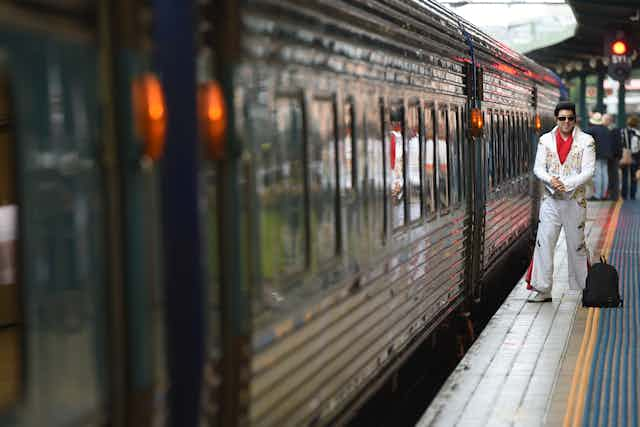Rural and regional Australia have had a hard time of late. The economies of Sydney and Melbourne are growing, but much of the rest of their states are not. The population of regional areas is stagnating and agriculture is struggling.
Perhaps worst of all there is a feeling that no-one in Canberra or in the booming coastal periphery cares about this. The people of Orange have apparently spoken.
Outside Sydney, behind what seems like an impervious sandstone curtain, not all is well. Even the largest towns in regional New South Wales are struggling to retain their populations and have faced difficult economic times through the present decade, although the drought years have faded away.

Agriculture still matters, for employment and exports, but mechanisation has cost jobs. Farming is still how people see rural and regional Australia, but it is certainly not the only thing.
There is more to rural Australia than agriculture, and most places have shifted away from the mass production of agricultural commodities – move over the wheat-sheep belt – towards the marketing of rural lifestyles and landscapes. Farming becomes valuable as scenery.
City people can be tempted for weekends away and old-fashioned farm stays have evolved. But that works most easily for NSW coastal towns – like Berry and Kiama – that are within striking distances of capital cities. More distant inland places have had to work a little harder to diversify.
Ironically, Orange is one of the towns that have led the way in terms of change. An enormously successful FOOD (Food of Orange District) festival has drawn in city crowds and tempted some to remain. At the other end of the state, the Tamworth Country Music Festival has grown every year and been a massive boost to regional income.
Jumpsuiting on the bandwagon
But it is probably even smaller towns that have benefited most from festivals. Most successful of all has been Parkes, otherwise simply a transport centre on the wheat and sheep plains. This week it celebrates the 25th anniversary of the Elvis Festival.
The whim of a handful of townsfolk, one of whom later changed his name to Elvis Lennox, the festival began in a tiny way in 1993. Parkes citizens were doubtful – what had Elvis to do with rural Australia? But the local newspaper, the tourism office and the rugby club – in jumpsuited style – got on board, and the festival boomed.
Once it lasted barely a weekend. Now it lasts five days. Two hundred people came to the first festival – now there are 20,000, almost twice the town’s population. Accommodation is booked five years in advance, home hosting extends to nearby towns like Forbes and even Orange, and tents overflow on Graceland on the Green.
The festival brings in more than A$10 million, employs many people, and has enabled even improbable local businesses to prosper. The local vet offers “Elvis costumes for the smaller dog”. The two tattoo parlours bring in new seasonal Elvis designs. Only the funeral directors appear to have failed to gain any trickle-down effects.
Certainly luck helps, but inspiration, patience and creativity – which are not only metropolitan traits – really work. Parkes now has its King’s Castle, an Elvis museum that ensures that Elvis and his famous gold lamé suit never leave town.
Where Parkes has succeeded, its neighbours have sought to follow. Trundle, once famous for having the widest main street in the country, is now more famous for its ABBA festival. Kandos, not much further from Parkes, is working hard to develop its Bob Marley Festival.
Who will claim Leonard Cohen? Unlike Elvis, he at least had visited Australia.
Musters and other big celebrations

There is music in the air in NSW and that music is creating employment, placing and keeping some small towns on the map and simply being a source of enjoyment when, as in the drought years of earlier this century, times were particularly tough.
The annual Deni Ute Muster has spurred revival in Deniliquin. The more static Utes in the Paddock – an open-air gallery of utes mounted in a parody of Stonehenge – breathed new life into tiny Ootha. Glen Innes remembered its Celtic ancestry and constructed an impressive circle of standing stones.
Meanwhile, the citizens of Nyngan, at the centre of Bogan Shire, are trusting that the statue of the Big Bogan (“who stands proud with his mullet, stubbies singlet and Southern Cross tattoo”) will breathe some new life into the town in the wake of the success of the Big Banana in Coffs Harbour. And who could resist Priscilla Queen of the Desert’s birthday bash at Broken Hill’s Broken Heel Festival?
But it is not only festivals. Mountain-biking trails may work just as well. Silverton has protected its heritage buildings and become a centre for the visual arts. Bowral can thank Don Bradman for growing up there. Hill End has set the pace in reviving gold panning.
None of these activities can ever effectively replace agriculture, but all have a part to play in making regional Australia a richer and more vibrant place.
Regional Australia cannot be written off. Services, tourism and the creative industries have become a vital part of the regional mix. And the smartest regions are those that have recognised this, sought diversity and flexibility, and become creative.
On January 12, the Elvis Express will roll into town, and Parkes will celebrate 25 years of a festival that has created employment, generated income, provided a degree of pleasure in the drought years and given one town more than a reason to hope.
John Connell and Chris Gibson are the authors of Outback Elvis: The story of a festival, its fans and a town called Parkes, which has just been published by New South.
This article has been amended to correct a reference to Bradman’s birthplace (he was born in Cootamundra but grew up in Bowral).

